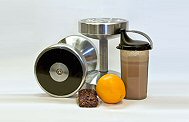Sports nutrition degree
In conclusion, added protein does not appear to improve endurance performance when given for several days, weeks, or immediately prior to and during endurance exercise https://free-spins-casino.org/. While no ergogenic outcomes may be evident, the scientific literature is consistent in reporting that adding protein to a carbohydrate beverage/gel during exhaustive endurance exercise suppresses markers of muscle damage (creatine kinase) 12 to 24 h post-exercise and decreases the endurance athletes’ feelings of muscular soreness . For these reasons, it seems prudent to recommend for endurance athletes to ingest approximately 0.25 g of protein/kg body weight per hour of endurance exercise (in addition to the athlete’s regular carbohydrate intake) to suppress markers of muscle damage and improve subjective feelings of muscular soreness . Another important consideration relates to the impact of ingesting protein along with carbohydrate on rates of protein synthesis and balance during prolonged bouts of endurance exercise. Beelen and colleagues determined that adding protein to carbohydrate consumption throughout a prolonged bout of endurance exercise promotes a higher whole body net protein balance, but the added protein does not exert any further impact on rates of MPS. While performance outcomes were not measured, these results shift the focus of nutrient ingestion during prolonged bouts of endurance exercise to the ingestion of carbohydrate.
The ISSN is recognized by established academic societies The ISSN conferences, tutorials, lectures and courses have been recognized (vis a vis attaining continuing education credits) by the Commission on Dietetic Registration, National Strength and Conditioning Association, American College of Sports Medicine, American Council on Exercise, American Physical Therapy Association, National Association of Athletic Trainers and other organizations as well. Members of these organizations can earn continuing education credits by attending ISSN Conferences and Symposia. The ISSN is also recognized by many Universities as offering the latest, cutting edge and non-biased information about the science and application of sports nutrition and supplements. In addition, the ISSN regularly funds research projects; it should be noted that the ISSN does not pay for indirect costs for any project that it funds.
The International Society of Sports Nutrition (ISSN) provides an objective and critical review related to the intake of protein for healthy, exercising individuals. Based on the current available literature, the position of the Society is as follows:An acute exercise stimulus, particularly resistance exercise, and protein ingestion both stimulate muscle protein synthesis (MPS) and are synergistic when protein consumption occurs before or after resistance exercise.For building muscle mass and for maintaining muscle mass through a positive muscle protein balance, an overall daily protein intake in the range of 1.4-2.0 g protein/kg body weight/day (g/kg/d) is sufficient for most exercising individuals, a value that falls in line within the Acceptable Macronutrient Distribution Range published by the Institute of Medicine for protein.Higher protein intakes (2.3-3.1 g/kg/d) may be needed to maximize the retention of lean body mass in resistance-trained subjects during hypocaloric periods.There is novel evidence that suggests higher protein intakes (>3.0 g/kg/d) may have positive effects on body composition in resistance-trained individuals (i.e., promote loss of fat mass).Recommendations regarding the optimal protein intake per serving for athletes to maximize MPS are mixed and are dependent upon age and recent resistance exercise stimuli. General recommendations are 0.25 g of a high-quality protein per kg of body weight, or an absolute dose of 20-40 g.Acute protein doses should strive to contain 700-3000 mg of leucine and/or a higher relative leucine content, in addition to a balanced array of the essential amino acids (EAAs).These protein doses should ideally be evenly distributed, every 3-4 h, across the day.The optimal time period during which to ingest protein is likely a matter of individual tolerance, since benefits are derived from pre- or post-workout ingestion; however, the anabolic effect of exercise is long-lasting (at least 24 h), but likely diminishes with increasing time post-exercise.While it is possible for physically active individuals to obtain their daily protein requirements through the consumption of whole foods, supplementation is a practical way of ensuring intake of adequate protein quality and quantity, while minimizing caloric intake, particularly for athletes who typically complete high volumes of training. Rapidly digested proteins that contain high proportions of essential amino acids (EAAs) and adequate leucine, are most effective in stimulating MPS. Different types and quality of protein can affect amino acid bioavailability following protein supplementation. Athletes should consider focusing on whole food sources of protein that contain all of the EAAs (i.e., it is the EAAs that are required to stimulate MPS). Endurance athletes should focus on achieving adequate carbohydrate intake to promote optimal performance; the addition of protein may help to offset muscle damage and promote recovery. Pre-sleep casein protein intake (30-40 g) provides increases in overnight MPS and metabolic rate without influencing lipolysis.

Degrees in sports nutrition
Dr. Huberty brings with her a wealth of industry practice in both private and public sport and recreation settings. Research interests and publications focus on sport marketing and sponsorship, gender diversity within sport management, and sport leadership. Learn more about Dr. Huberty here.
UNC’s MPH Nutrition concentration prepares students to provide, evaluate and communicate nutritional and dietary guidance that improves individual and population-wide health outcomes. In addition to developing their knowledge of nutrition science, students will explore behavior change, communication, counseling and the effects of dietary culture on individuals and communities.
CSP Global’s PhD or EdD in Kinesiology with a concentration in Sports Nutrition gives you the tools and knowledge needed to succeed in a dynamic and growing field. Whether you aim to conduct groundbreaking research, work with elite athletes, or lead wellness initiatives, this program can help you achieve your goals. With a flexible online format, experienced faculty, and a curriculum designed to meet the needs of today’s sports nutrition professionals, CSP Global is the ideal choice for your advanced education.

Dr. Huberty brings with her a wealth of industry practice in both private and public sport and recreation settings. Research interests and publications focus on sport marketing and sponsorship, gender diversity within sport management, and sport leadership. Learn more about Dr. Huberty here.
UNC’s MPH Nutrition concentration prepares students to provide, evaluate and communicate nutritional and dietary guidance that improves individual and population-wide health outcomes. In addition to developing their knowledge of nutrition science, students will explore behavior change, communication, counseling and the effects of dietary culture on individuals and communities.
Degree in sports nutrition
The sports nutrition program focuses on the application of nutrition principles as they relate to sport and human performance. Students will explore how nutrition impacts performance. Graduates will be prepared for careers including sports nutrition, personal training or work in the fitness industry, including product development and research. Students may choose to supplement their academic training with national certification in a specific area including personal trainer, strength and conditioning coach or health coach.
*This estimate includes online tuition and College of Health and Human Sciences fees and is for illustrative purposes only. Your hours and costs will differ depending on your transfer hours, course choices and your academic progress. See more about tuition and financial aid.
The curriculum at CSP Global is designed to offer both theoretical knowledge and practical application in the nutritional sciences. Students enrolled in the PhD or EdD in Kinesiology with a concentration in Sports Nutrition will take courses that cover a broad range of topics, including:

